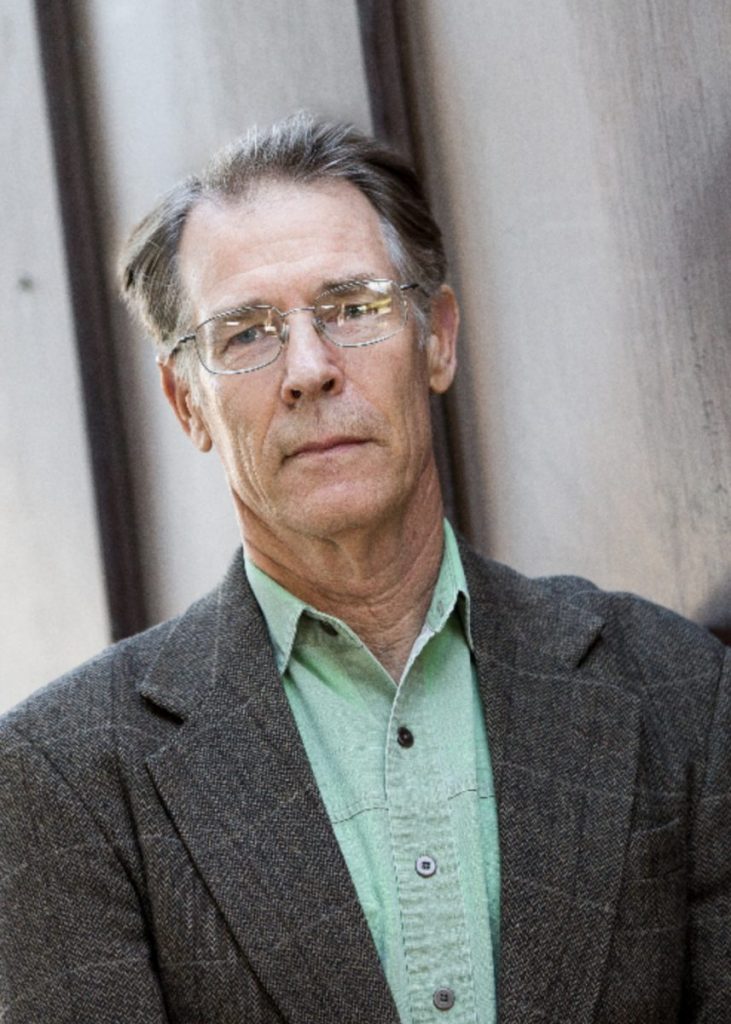
Kaitlyn Finchler
Staff writer
In a small Indian town, unsurvivable heat plagues the population. The government sends planes to spray sulfur dioxide to mimic the dimming effect of volcanic eruptions. Such is the premise of The Ministry for the Future, in which American science fiction writer Kim Stanley Robinson explores climate change through the capacity of literature.
For a combined Chautauqua Lecture Series and Chautauqua Literary and Scientific Circle presentation, Robinson will speak at 10:45 a.m. today in the Amphitheater to close the Week Six theme, “A Life of Literature,” as well as the CLSC’s Recognition Week.
“I’ll give my description of how I think literature works, especially in the novel, and specifically the scientific fiction novel,” Robinson said, “and why this can be an important aid to imagining climate change and changing habits now.”
He said he hopes the audience imagines some of their own new ideas. Described by Jacobin as one of the “greatest ever socialist novelists,” Robinson has written three series, 12 novels, six short story collections, 20 short stories and seven non-fiction books. His book 2312 was nominated for all seven of the major science fiction awards — a first in the industry — and in 2016, Robinson received two monumental honors: the Heinlein Award for lifetime achievement in science fiction, and an asteroid named for him.
Robinson said writing is a “habit” he likes, and a life of literature looks like “a lot of my time reading and writing — learning particular writers by reading lots of their books, reading back in the canon, and across world literature. Dispensing with social media and visual media, for the most part — believing in literature as a kind of humanist religion.”
Few writers, said Michael I. Rudell Director of Literary Arts Sony Ton-Aime, “have embodied the meaning and the possibilities of a literary life” like Robinson.
“In his prolific and long writing career, with each new book, he offers us new ways and possibilities to understand one another and our communities,” Ton-Aime said — and The Ministry for the Future is no exception.
“Here is a book that engages and implicates us all in the biggest challenge that our species has ever faced. It presents us with solutions by imagining a new world that science cannot offer us yet,” he said. “This is what literature is supposed to do, and no other book, in my opinion, does it better than The Ministry for the Future.”
In an interview with Jacobin, Robinson said people should resist the idea of being doomed to climate disaster — and insists there’s a world beyond capitalism.
“I would say science fiction is a genre that divides into three parts: the far future, the near future and then a third, less frequent middle zone in time that I call ‘future history,’ ” Robinson told Jacobin, “which is about 100 to 300 years in the future … and it’s where I’ve placed many of my novels. But Ministry is near-future science fiction.”
While books are categorized into different genres, Robinson said “all books are based largely” around science, politics and the environment. This may not be something people are “aware of,” but he said he likes to stay aware — which is evident in his 2020 novel.
“The Ministry for the Future is a literary vision of the future,” Robinson said. “It deploys any number of genres in one novel to create a vivid sense of the next few decades.”




